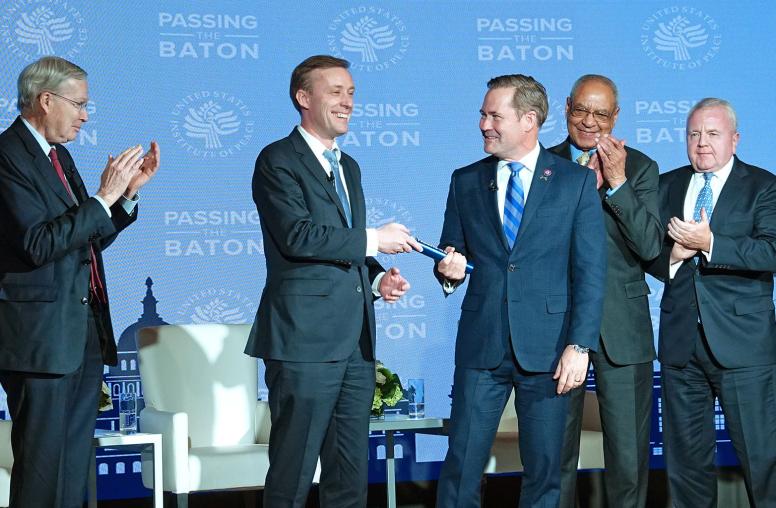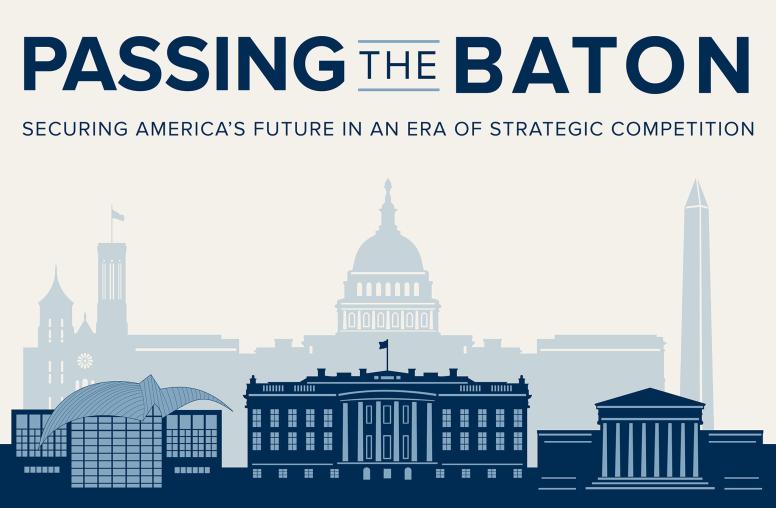Congressional Commission on the Strategic Posture of the U.S. Begins Work
The newly created Congressional Commission on the Strategic Posture of the United States recently began its work to — in the words of its congressional charter — “examine and make recommendations with respect to the long-term strategic posture of the United States.” The United States Institute of Peace (USIP) has been selected to facilitate the commission’s work. Congress created the commission, also known as the Strategic Posture Review Commission (SPRC), through the National Defense Authorization Act of 2008.
Contact:
Lauren Sucher Ian Larsen
+1-202-429-3822 +1-202-429-3870
(Washington, July 11) – The newly created Congressional Commission on the Strategic Posture of the United States recently began its work to — in the words of its congressional charter — “examine and make recommendations with respect to the long-term strategic posture of the United States.” The United States Institute of Peace (USIP) has been selected to facilitate the commission’s work. Congress created the commission, also known as the Strategic Posture Review Commission (SPRC), through the National Defense Authorization Act of 2008.
The SPRC will broadly review the nation’s strategic posture, including an array of capabilities and military programs such as conventional strategic systems, nonproliferation and counterproliferation programs, missile defense systems and the future of nuclear weapons.
The House Armed Services Committee named six of the 12 bipartisan commissioners, including former secretary of defense William Perry as commission chairman. The Senate Armed Services Committee named the remaining six, including former secretary of defense and secretary of energy James Schlesinger as vice chair. The group will seek bipartisan consensus among its members and report its findings to Congress in the spring of 2009.
SPRC chairman Perry asked USIP to facilitate the effort because of its experience and professionalism as the nonpartisan facilitator of the Iraq Study Group (ISG) in 2006. Perry was an ISG member and worked closely with USIP during the group’s deliberations.
“The proliferation of nuclear technology and materials is a major war and peace issue of the 21st century, and how to deal with it is one of the most difficult issues the U.S. must come to terms with,” said USIP president Richard H. Solomon. “The U.S. Institute of Peace has a strong history of professionally facilitating bipartisan commissions that have examined equally difficult questions in international conflict, and we are pleased to do so again with the SPRC.”
“USIP’s work as facilitator of the Iraq Study Group and the Task Force on the United Nations, as well as our work with the Genocide Prevention Task Force, has demonstrated our ability to convene disparate parties to study crucial issues in international affairs and make recommendations for the good of the country,” said USIP board chairman J. Robinson West.
USIP’s role with the SPRC will be similar to its role with the ISG. It will convene plenary sessions, recommend subject areas to be examined and experts to be interviewed, coordinate working groups, and provide logistical support.
USIP will partner with the Institute for Defense Analyses (IDA), which will provide support for all classified activities the commission may undertake during its review process. USIP staff will not be in possession of classified materials at any time during the commission’s work.
The SPRC has created five expert working groups to assist in the analysis of U.S. strategic issues during its work. The groups include National Security Strategy and Policies; Deterrent Force Posture; Nuclear Infrastructure; Countering WMD Proliferation; and External Conditions and Trends. The expert working groups will be chaired by notable experts in the field.
The names of the SPRC commissioners and expert working group chairs are listed below.
SPRC Commissioners:
- William Perry, Commission Chairman, former Secretary of Defense;
- James Schlesinger, Commission Vice Chairman, former Secretary of Energy and Secretary of Defense;
- John Foster, Director Emeritus of Lawrence Livermore National Laboratory;
- Lee Hamilton, former Congressman and Vice Chair of the 9/11 Commission;
- Keith Payne, CEO and President, National Institute for Public Policy;
- Ellen Williams, University of Maryland Distinguished Professor;
- Harry Cartland, former physicist, Lawrence Livermore National Laboratory;
- John Glenn, former Senator and NASA astronaut;
- Fred Ikle, former Director, Arms Control and Disarmament Agency;
- Morton Halperin, former Deputy Assistant Secretary of Defense for International Security Affairs;
- James Woolsey, former Director, Central Intelligence Agency;
- Bruce Tarter, former Director, Lawrence Livermore National Laboratory.
SPRC Expert Working Groups and Chairs:
- National Security Strategy & Policies – Dr. Ashton Carter, chair
- Deterrent Force Posture – Admiral (Ret.) Dennis C. Blair, chair
- Nuclear Infrastructure – Linton Brooks, chair
- Countering WMD Proliferation – Dr. Arnold Kanter, chair
- External Conditions & Trends – Dr. Gordon Oehler, chair



